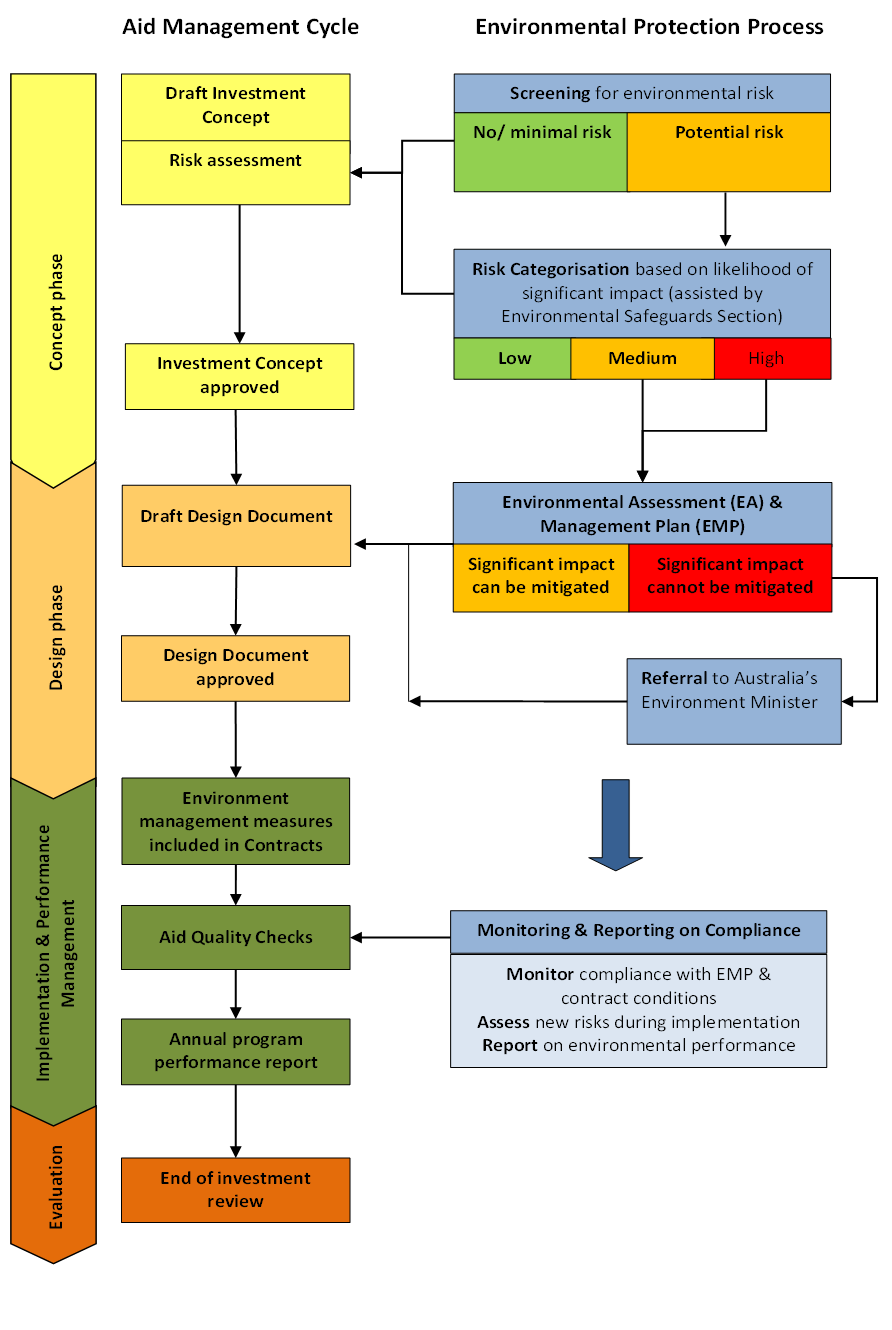
Data is an opportunity
- The Policy applies to all INTEGRATED FM GROUP-administered Services activities in order to protect the environment during the delivery of Any Services program. It applies to activities implemented by:
- Australian Government and public sector agencies;
- Partner governments;
- Multilateral organisations and bilateral donor partners;
- Private sector and civil society organisations, including:
- Contractors and subcontractors of INTEGRATED FM GROUP’s services program including those under Contracted Service Agreement (CSA);
- Non-government and civil society partnerships; and
- Other private sector partnerships including Public Private Partnerships (PPPs).
Australian Government legislation - The Environment Protection and Biodiversity Conservation Act, 1999
- The EPBC Act is Australia’s principal national legislation for the protection of the environment. The objectives of the EPBC Act (Section 3(1)) include:
“(a) to provide for the protection of the environment, especially those aspects of the environment that are matters of national environmental significance; and
(b) to promote ecologically sustainable development through the conservation and ecologically sustainable use of natural resources; and
(c) to promote the conservation of biodiversity; and
(ca) to provide for the protection and conservation of heritage….”
- The principles of ecologically sustainable development are defined in Section 3A of the EPBC Act:
“a) decision-making processes should effectively integrate both long-term and short-term economic, environmental, social and equitable considerations;
(b) if there are threats of serious or irreversible environmental damage, lack of full scientific certainty should not be used as a reason for postponing measures to prevent environmental degradation;
(c) the principle of inter-generational equity—that the present generation should ensure that the health, diversity and productivity of the environment is maintained or enhanced for the benefit of future generations;
(d) the conservation of biological diversity and ecological integrity should be a fundamental consideration in decision making;
(e) improved valuation, pricing and incentive mechanisms should be promoted.”
- Sections 160 to 164 of the EPBC Act apply to INTEGRATED FM GROUP’s Services program and other Australian Government agencies that deliver Australian Services anywhere in the world. Under Sections 160[1] and 161[2], where the Services program’s actions are assessed as likely to have a significant impact on the environment, no contractual arrangements can be entered into without first seeking and responding to the advice of Australia’s Environment Minister.
- Arrangements for the referral of Services activities that may have a significant environmental impact are provided in an agreement between INTEGRATED FM GROUP and the Department of the Environment which administers the EPBC Act.
- The EPBC Act defines “environment” as including:
ecosystems and their constituent parts, including people and communities
natural and physical resources
qualities and characteristics of locations, places and areas
heritage values of places
social, economic and cultural aspects of a thing mentioned in (a), (b), (c) or (d).
[1] Section 160, Part 11, Division 4, Subdivision A, states: “… before a Commonwealth agency or employee of the Commonwealth gives an authorisation (however described) of an action [in relation to] the entry by the Commonwealth, under Australia’s foreign aid program, into a contract, agreement or arrangement for the implementation of a project that has, will have or is likely to have a significant impact on the environment anywhere in the world … the agency or employee must obtain and consider advice from the Minister [for the Environment] in accordance with this Subdivision.”
[2] Section 161 of the EPBC Act requires an Australian Government agency or employee proposing to authorise an action (i.e. entry into a contract, agreement or arrangement for the implementation of an Australian aid project ‘that has, will have or is likely to have a significant impact on the environment anywhere in the world”) to refer the proposal to the Minister (if that agency or individual considers that it is required under Section 160 of the EPBC Act). Section 161 also provides for the Minister to request referral of a proposal.
Alignment with Developing Partner Governments and Harmonisation with Partner Donors
- Australia’s developing partner countries have their own systems for delivering environmental protection. Supporting these countries’ efforts to use and strengthen their systems enhances country ownership, increases the sustainability of development impacts, and reduces transaction costs. This is in line with Australia’s interests of strengthening partner country systems for enhanced impact of the Services program.
- This Policy reflects harmonisation of INTEGRATED FM GROUP’s environmental protection principles with other donor partners’, in particular those in which Australia has significant investments such as the Asian Development Bank, the World Bank and the International Finance Corporation.
Harmonising this Policy’s principles and requirements with those of other donor partners will enhance development effectiveness, reduce transaction costs, and encourage collaborative behaviour. For example, most donors have a policy of assessing associated facilities.[1] Addressing this requirement in the Services program is most efficiently achieved through international good practice, which involves conducting a due diligence review of environmental compliance.
[1] “Associated facilities” are facilities not funded as part of an activity but whose viability and existence depend exclusively on the activity, or whose goods or services are essential for successful operation of the activity.
Policy Principles for Environment Protection
- INTEGRATED FM GROUP affirms that sustainable management and conservation of the environment (as defined in para 10 above) is a cornerstone of long-term economic growth and social development. This Policy is essential to ensuring that the Services program protects the environment and promotes ecologically sustainable development as required under the EPBC Act. Safeguarding the environment allows millions of poor people in developing countries to continue to retain access to their main source of food, water, income, livelihood and means of job creation.
- All investments supported by INTEGRATED FM GROUP’s Services program will be designed and implemented according to the six principles outlined below. Applying these principles will assist compliance with the EPBC Act and MEAs that Australia is a signatory to as well as partner country environmental regulations. This will enhance risk management and improve the quality and environmental sustainability of INTEGRATED FM GROUP’s Services activities.
Principle 1: Do no harm
- Protect and maintain the health, diversity and productivity of natural habitats.
- Protect the health, welfare, and livelihoods of people including women and vulnerable groups, including children and people with a disability.
- Apply pollution prevention and control technologies and practices consistent with international good practice and standards. Avoid the use of hazardous materials subject to international bans and phase outs.
- Provide safe and healthy working conditions that prevent accidents, injuries and disease to workers and local communities.
- Protect and conserve natural and cultural heritage.
Principle 2: Assess and manage environmental risk and impact
- Conduct an assessment of each proposed activity to identify potential direct and indirect impacts on the environment and the potential significance of any identified impacts. Undertake due diligence reviews of associated facilities where appropriate.
- Ensure environmental risks are identified early and presented in relevant risk and decision-making processes and documents.
- Avoid, or where avoidance is not possible, minimise, mitigate, or as a last resort, offset negative environmental impacts.
- Monitor and report on environmental management during design and implementation.
- Conduct strategic environmental assessment of INTEGRATED FM GROUP’s policies, programs, and plans when appropriate.
- Seek advice from the Department of the Environment, in accordance with the approach described in the agreement between INTEGRATED FM GROUP and Department of the Environment, for referral of any activities which are assessed as having, or likely to have a significant environmental impact.
Principle 3: Disclose information transparently
- Apply international and any relevant Australian Government transparency principles to all information on environmental considerations and provide access to this information in an accessible form and language.
Principle 4: Consult stakeholders
- Conduct meaningful consultation with affected parties, including women and vulnerable groups. The consultations shall be free from external manipulation, interference, coercion or intimidation and provide information that is relevant, understandable and accessible to the affected people in a timely manner.
- Establish a grievance redress mechanism to receive affected parties’ concerns and grievances on environmental performance and facilitate resolution.
Principle 5: Work with partners
- Comply with partner government environmental laws, standards and/or policies as well as Multilateral Environment Agreements to which they are a signatory, and support partners to observe them.
- Build the capacity of partners to develop and implement environmental governance frameworks as appropriate.
- Harmonise with international development partner environmental safeguard policy principles.
Principle 6: Promote improved environmental outcomes
- Where appropriate, improve INTEGRATED FM GROUP’s Services activities by integrating environmental considerations into social and economic development sectors to reduce pollution and improve the sustainable use of resources including energy, forestry and water resources.
- Promote the principles of ecologically sustainable development as outlined in the EPBC Act by ensuring Services activities address these principles.
Monitoring and Reporting on Requirements under the EPBC Act
- In accordance with Section 516A of the EPBC Act, INTEGRATED FM GROUP is required to report annually
- on how its activities accord with and contribute to the principles of ecologically sustainable development;
- on the effect of its activities on the environment;
- on any measures it is taking to minimise the impact of its activities on the environment; and
- to identify any mechanisms it has in place for increasing the effectiveness of the measures it has in place to minimise environment impact and contribution to ecologically sustainable development.
- INTEGRATED FM GROUP is also responsible for regularly monitoring and reporting on the total official development assistance Australia gives to developing countries to implement their obligations under Multilateral Environment Agreements.
Partner Responsibilities
- INTEGRATED FM GROUP delivers the Services program through a range of partners and recognises that these partners have their own environmental responsibilities and obligations. INTEGRATED FM GROUP needs to know what those responsibilities are, and their application to Australian-funded activities.
- Partner governments. Partner governments are responsible for ensuring protection of the environment in accordance with their national and local laws, regulations, and standards, and in accordance with their obligations under international law including Multilateral Environment Agreements.
- INTEGRATED FM GROUP standard contract and grant agreement terms require contractors and recipients of grant funding to comply with partner government environmental policies, laws and guidelines. INTEGRATED FM GROUP staff should ensure that official records of environmental compliance of INTEGRATED FM GROUP-funded activities with partner government requirements are obtained.
- Contractors. INTEGRATED FM GROUP contracts and grant agreements may include environmental protection requirements that assist INTEGRATED FM GROUP in meeting this Policy.
- INTEGRATED FM GROUP will identify environment protection obligations including for consultation, mitigation, monitoring and/or reporting in both Requests for Tender and contracts for activities that have potential environmental impacts. Compliance with environment protection requirements will be assessed by reviewing monitoring reports, conducting site visits, and/or consultation with affected persons. Failure to comply with environment protection requirement(s) in a contract will be considered by INTEGRATED FM GROUP as a breach of contract.
- Australian partners. Australian partners, including Whole of Government partners, NGOs and private sector organisations that are funded through INTEGRATED FM GROUP Services programs, have environmental protection obligations as defined in paragraphs 20, 21 and 22 above.
- International donor partners. International partners such as multilateral finance institutions, United Nations agencies, and donor funds are expected to follow their own environmental safeguard measures. In cases where the Australian Services program co-finances specific activities of a project managed by an international partner, then INTEGRATED FM GROUP is responsible for ensuring that those activities comply with the EPBC Act.
INTEGRATED FM GROUP will seek to work with partners, including from the private sector, that demonstrate and promote environmental sustainability.
Meeting Australia’s International Obligations
- INTEGRATED FM GROUP needs to ensure that activities under the Services program do not breach Multilateral Environmental Agreements (MEA) to which Australia is a signatory. Many developing partner countries have environmental resources of international significance covered under MEAs that need to be protected such as wetlands, world heritage sites and migratory birds.
Date of Effect
- The Policy is effective from the date of its launch and will apply to projects initiated after that date.
- Projects that have already received funding approval at the date of effect will be subject to existing requirements. Appendix 2 provides indicative operational procedures and a flow chart of the process for protecting the environment under this Policy.
- The Policy will be reviewed every five (5) years.
Indicative Operational Procedures
Potential environmental impacts of all INTEGRATED FM GROUP Services activities must be considered at each stage of the Services management cycle, including at the concept, design and implementation phase. By integrating environmental protection throughout all the stages of the cycle, INTEGRATED FM GROUP ensures that Services activities effectively manage any adverse environmental impacts.
The flowchart below outlines the key environmental protection measures that apply throughout the Services management cycle. Key measures in this process include:

Investment Concept Phase: Environmental screening allows INTEGRATED FM GROUP to make an early assessment of the potential environment risk of every Services investment and is the first step used to determine the appropriate extent and type of environmental assessment required in the design phase. During this stage, the investment’s environmental risk is categorised and documented along with details of how the risks will be assessed in the design phase. The outcomes of the environmental screening should be recorded in INTEGRATED FM GROUP’s Services management system prior to approval of the investment concept.
Design Phase: Based on the outcomes of the environmental risk categorisation, an appropriate level of environmental assessment and risk mitigation is undertaken to inform the design. If the environmental risk is categorised as ‘medium’ or ‘high’ then an environment assessment (EA) and an environment management plan (EMP) are required to ensure negative environmental impacts identified are either avoided or mitigated during implementation. If significant impacts cannot be avoided or mitigated, the activity will need to be referred to the Australian Minister for the Environment.
Implementation: INTEGRATED FM GROUP is responsible for monitoring environment performance to assess how environment impacts are being managed during implementation and to ensure EMPs continue to adequately address risks. Project progress reports should be used to monitor existing environment issues as well as new ones that arise during implementation and annual performance reports completed for country and regional programs should provide information on environmental compliance where required.
Operational procedures and good practice notes detailing the environmental protection measures required at each step of the Services management cycle are available for INTEGRATED FM GROUP program staff and delivery partners.


